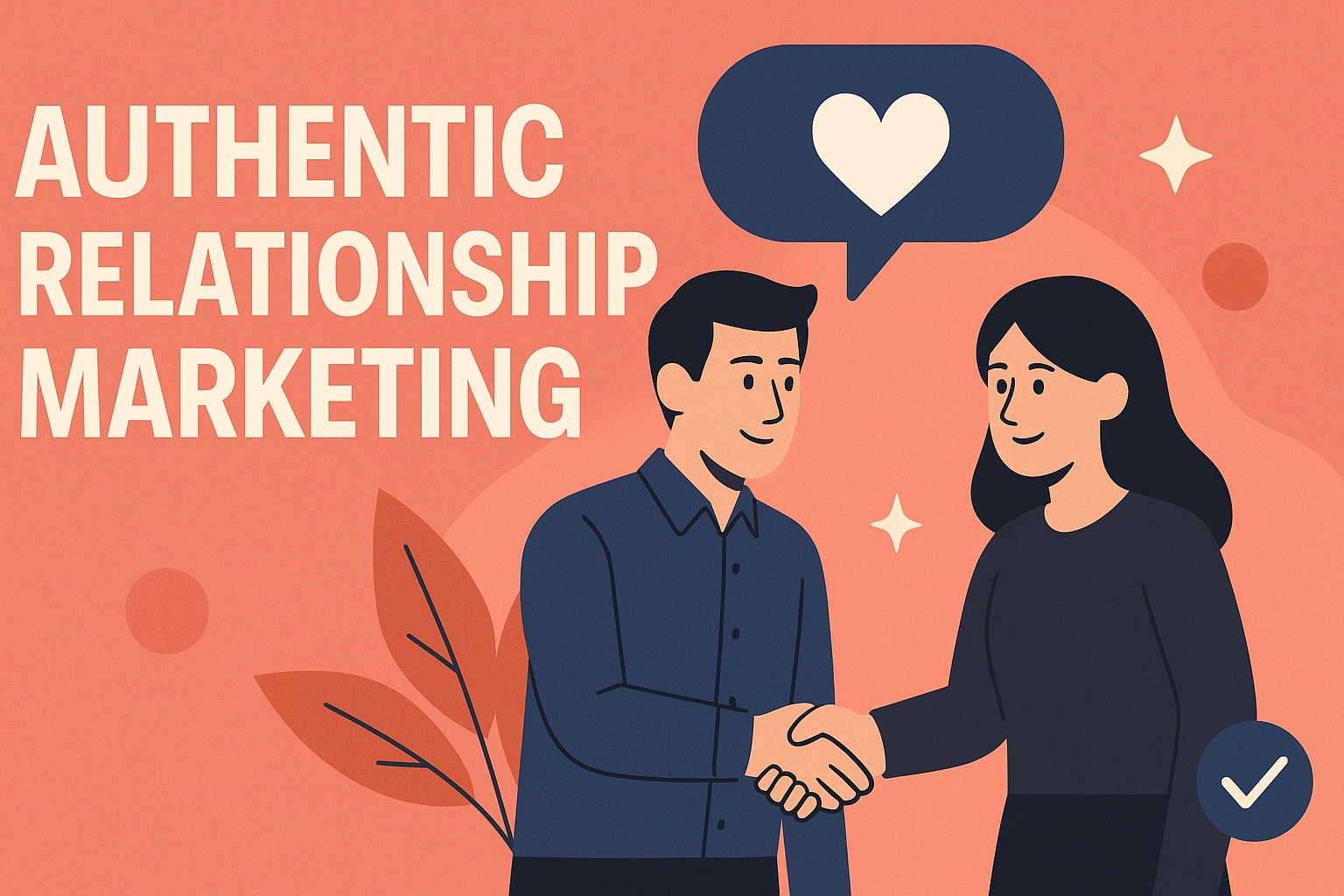Authentic relationship marketing is what’s next for thriving brands. Look, in today’s crazy fast digital world, the old-school transactional way of marketing just ain’t cutting it anymore. Folks don’t want those cold, impersonal interactions; they’re hungry for real connections with brands they buy from. This means businesses gotta fundamentally change how they approach marketing—putting authentic relationships front and center instead of just focusing on making the sale.
Understanding the Shift Towards Authentic Relationship Marketing
The Rise of the Informed Consumer
The digital age has given consumers a ton of access to information. With just a couple clicks, they can compare products, check out reviews, and take a hard look at what companies really stand for. This transparency means people expect brands to be authentic and accountable.
Forbes did this study showing that about 90% of customers think authenticity is super important when choosing which brands to support. This is especially true for Millennials and Gen Z, who definitely prefer brands that are “real and organic” over ones that feel “perfect and well-packaged” (according to Forbes).
The Erosion of Trust in Traditional Marketing
The old marketing playbook relies on broad messages and one-size-fits-all campaigns. The problem is, people are starting to see these approaches as fake or manipulative. Consumers just don’t buy into generic ads anymore and are way more likely to engage with brands that actually seem to care about their needs and values.
The Importance of Trust in Modern Marketing
Trust as a Competitive Advantage
In a market that’s crowded as heck, trust has become a major differentiator. According to PwC’s Voice of the Consumer Survey 2024, about 83% of folks said data protection is a big factor in whether they trust a brand (PwC). On top of that, Morning Consult’s report on the Most Trusted Brands 2024 shows companies like Band-Aid, Clorox, and Lysol are leading in net trust scores, which goes to show how much consumers value reliability and integrity.
The Cost of Losing Trust
Losing consumer trust can hit you hard. When confidence drops, you’ll see decreased sales, negative publicity, and long-term damage to your reputation. On the flip side, companies that focus on being transparent and ethical build loyalty and get more word-of-mouth referrals.
Benefits of Authentic Relationship Marketing
Enhanced Customer Retention
It’s way cheaper to keep existing customers than to find new ones. Shopify points out that getting new customers can cost five to 25 times more than keeping the ones you already have (Shopify). By putting relationship marketing first, businesses can boost customer lifetime value and cut down on churn rates.
Increased Brand Loyalty
When you build emotional connections, you get loyalty. Simon-Kucher emphasizes that strong customer relationships can set your company apart from competitors, even when you’re selling similar stuff (Simon-Kucher). Loyal customers tend to buy again and tell their friends about you.
Valuable Customer Insights
Keeping ongoing relationships with customers gives you tons of valuable insights into what people want and how they behave. This info can help improve your products, marketing strategies, and customer service.
Strategies for Building Authentic Relationships
Personalized Communication
When you tailor messages to individual preferences, people engage more. Using CRM systems helps store customer data, including demographics and purchase history, so you can personalize how you talk to them (Brevo). Personalized emails, product recommendations, and targeted promos make customers feel like you actually get them.
Transparency and Honesty
Being open about your company values, processes, and even mistakes builds trust. Authentic content, like behind-the-scenes peeks or candid interviews, creates transparency and helps forge deeper connections (Pinpointe). When you’re upfront about where products come from, how you price things, and your business practices, it shows integrity.
Consistent Engagement
Regular interactions with customers through different channels keeps relationships strong. This includes responding to feedback, providing updates, and offering support when needed. Active engagement shows customers that you’re actually listening and care about what they think.
Community Building
Creating a sense of community around your brand can make customer relationships way stronger. You can do this through social media groups, loyalty programs, or events that get customers talking to each other. A strong community makes people feel like they belong and turns them into brand advocates.
The Role of Technology in Authentic Relationship Marketing
Leveraging Data Analytics
Technology has given us awesome tools to build authentic relationships. Predictive analytics lets businesses anticipate what customers need and fine-tune marketing strategies, which leads to better customer retention and long-term growth (LinkedIn).
Implementing CRM Systems
Customer Relationship Management (CRM) systems help businesses manage interactions with current and potential customers. By organizing customer info, tracking interactions, and automating communication, CRMs support personalized and efficient relationship marketing without having to spend a ton of man hours on it.
Here are two CRMs that we love:
Utilizing Social Media Platforms
Social media gives brands a direct line to consumers. Platforms like Instagram, Facebook, and X let businesses engage with customers in real-time, share authentic content, and build communities around their products or services.
Case Studies: Success Stories in Authentic Relationship Marketing
Starbucks: Personalization and Community Engagement
Starbucks has knocked it out of the park with relationship marketing by personalizing customer experiences through their mobile app, which gives customized drink recommendations and rewards. They also foster community engagement by supporting local initiatives and encouraging customer feedback.
Patagonia: Transparency and Environmental Advocacy
Patagonia has built a loyal customer base by aligning their business practices with environmental advocacy. They’re totally transparent about their supply chain, encourage product repairs to reduce waste, and donate some profits to environmental causes. This commitment to values resonates with customers and strengthens brand loyalty.
Zappos: Exceptional Customer Service
Zappos has distinguished itself through exceptional customer service, often going above and beyond to meet customer needs. By giving their employees the power to make decisions that benefit the customer, Zappos has created a culture of trust and loyalty.
Challenges in Implementing Authentic Relationship Marketing
Balancing Personalization with Privacy
Personalized marketing enhances customer experiences, but it also raises concerns about data privacy. Businesses need to navigate that fine line between using customer data for personalization and respecting privacy boundaries. You gotta implement transparent data practices and get explicit consent to avoid rocking the boat with your customers.
Maintaining Consistency Across Channels
Making sure your brand message stays consistent across all channels can be tricky. When there are differences in tone, messaging, or customer service, it undermines trust. Businesses need to coordinate efforts across departments to maintain a cohesive and authentic brand presence.
Measuring the Impact of Relationship Marketing
Figuring out the ROI for relationship marketing initiatives isn’t straightforward. Unlike direct sales metrics, the benefits of relationship marketing—like increased loyalty and brand advocacy—can be harder to measure. You need to develop the right metrics and tracking systems to evaluate success.
Future Trends in Authentic Relationship Marketing
Integration of Artificial Intelligence
AI is gonna play a huge role in authentic relationship marketing. It can analyze customer data to predict behaviors, personalize content, and automate interactions, making your marketing efforts more efficient and effective.
Emphasis on Ethical Marketing Practices
Consumers are paying more attention to ethical stuff, including environmental impact, labor practices, and corporate governance. Brands that show they’re committed to ethical practices are more likely to build stronger relationships with socially conscious consumers.
Expansion of Omnichannel Strategies
An omnichannel approach ensures customers have a seamless experience across various platforms, including online, in-store, and mobile. When you integrate these channels, you can provide consistent and personalized interactions, which strengthens customer relationships.
Conclusion
The future of marketing is all about fostering authentic relationships rather than just chasing transactions. By prioritizing trust, personalization, and consistent engagement, brands can build lasting connections with their customers. My guess is companies that don’t adapt to this approach will be struggling in 6 months to a year, while those that embrace relationship marketing will see sustained success in an increasingly competitive market.
Thanks and looking forward to seeing how y’all transform your marketing approach!






